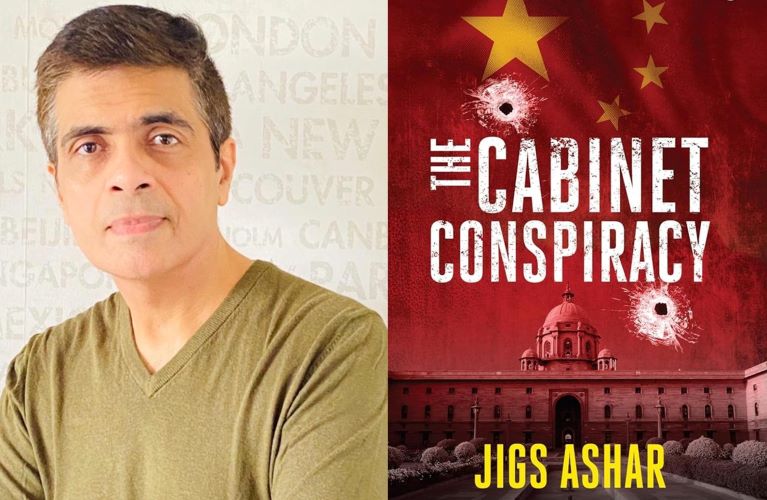Team L&M
Jigs Ashar is back with another thriller The Cabinet Conspiracy (Srishti Publishers), an international political espionage set in the corridors of power in India. Inspired by real events, The Cabinet Conspiracy is an edge-of-the-seat thriller about a plot to assassinate India Premier. The story is set in today, just a few months before the elections and has a rattled co-conspirator in China, whose Belt & Road project has been thwarted. The real events and characters woven expertly into the story blur the lines between fact and fiction.
Following is an extract (Page 37-40) from the book:
Two corpses were sprawled on the floor, their dead limbs intertwined. Blood, dried and congealed on the dead men’s chests, had formed a sticky pool on the floor, disappearing under the berths. Anant gasped audibly as his eyes fell on the motionless child. Careful not to disturb the evidence, he took two steps inside the cabin and gingerly felt the boy’s pulse. He heaved a sigh of relief as the boy stirred slightly at his touch. He swiftly lifted the child and rushed out of the cabin.
‘Get an ambulance – now!’ he yelled at the cop on the platform.
‘It’s on its way, sir,’ the cop replied, ‘forensics, too.’
‘Good, seal the compartment. There was nothing else left to see there.’
Almost at the same time as Anant came out of the compartment on to the platform, he saw a team of paramedics rushing towards them, wheeling a stretcher behind them. Anant, carrying the child, hastened towards them. A young doctor took the child from Anant and laid him gently on the stretcher.
‘He seems to be unconscious,’ Anant explained.
‘We’ll take it from here, officer,’ the doctor said reassuringly.
‘I want to know how he is doing,’ Anant told his fellow policeman, pointing to the child.
‘Yes, sir.’
‘So, you found the bodies when the train arrived at LTT?’ Anant asked, turning his attention to the train attendant again.
‘Yes, sir. I always check the cabins at the end of every journey. And when I opened that cabin, I saw…’ the attendant turned pale, as his voice trailed off .
‘And the boy was in the same state?’
‘Yes, sir. But I could make out he was alive. I immediately called the police.’
‘You did well. And that was around an hour back,’ Anant said, glancing at his watch. ‘Did you hear the shots? Or the sound of any scuffle?’
‘Nothing, sir. I was in the fi rst cabin. This happened in the last.’
‘What about the other passengers in the compartment?’
‘Sir, the train was almost empty after we passed Roha, which is normally the case. They were the only other passengers in the compartment,’ the attendant said, pointing to an old couple seated on a bench almost at the end of the platform.
Anant walked towards the couple. The old man, almost completely bald except for a few stray strands of white, sat slightly hunched. His wife, almost the same age, sat beside him. Their bags – a black trolley bag and a hand-bag – were on the platform, next to the bench. A walking cane leaned on the bench next to the old man.
‘Hello, I am Inspector Anant Kulkarni. Sorry to have kept you waiting,’ he greeted the couple.
From his face, it was clear that the old man was exhausted. The frail lady, with neatly parted jet-black, dyed hair, smiled warmly at Anant.
‘As you know, there has been an unfortunate incident. I hope you don’t mind me asking a few quick questions,’ Anant said politely.
The couple nodded slowly in unison.
‘Did you see or hear anything that could help us?’ Anant asked, squatting in front of them.
‘We have nothing to say. We were in our cabin most of the time, except…’ the man said, shaking his head.
‘Except what?’
‘Just when the train was arriving at Thane, I saw a passenger getting off … a woman…’ the lady said, taking over from where her husband had left off .
‘A woman… can you tell me anything more about her?’
‘Nothing… she was wearing a burqa,’ the old lady shook her head.
‘Show me the passenger chart,’ Anant told the attendant.
The railway attendant handed over a bunch of stapled sheets of paper, with the complete list of passengers. He turned the pages, and tapped on the names against the AC fi rst class list. Anant took the list from him and studied the names. The attendant, standing by his side, leaned over and offered his comments.
‘This is the woman,’ he said, pointing to a name, ‘she got in at Madgaon with the child.’
Anant stared at the names. Salma Abbas, 36. Farooq Abbas, 4.He shook his head. Fake, he was sure.
‘So did he,’ the attendant said, pointing another name. Clement Gomes, 27. ‘The one with the tattoo,’ he added.
‘And the other man?’
‘He… he must have boarded later… his name is not on the list… must be some error,’ the attendant stuttered.
Anant frowned, and asked, ‘Did you get a look at the woman anytime during the journey?’
‘Not really… she had a dupatta over her head and most of her face when I went to check the tickets.’
‘Anything at all to describe her?’
‘She was wearing glasses… salwar-kameez, with a sweater on top… and the dupatta… one thing that struck me were her green eyes.’
‘Take his statement,’ Anant told his fellow cop, who was busy talking with the forensics team that had just arrived.
‘Yes, sir,’ the cop replied.
‘Also, check the CCTV footage at Thane station. We know it was a lady in a burqa – where did she go?’ Anant added.
After giving his final instructions to the police team, as Anant left the platform, a strong sense of foreboding engulfed him.
